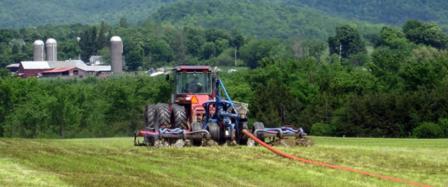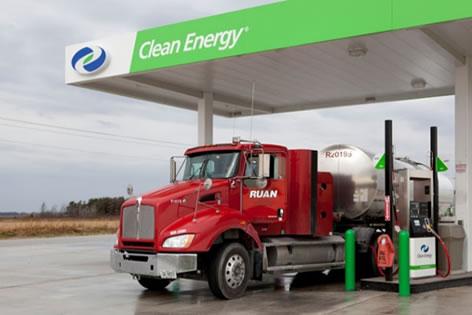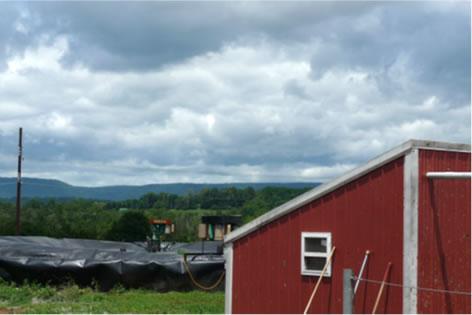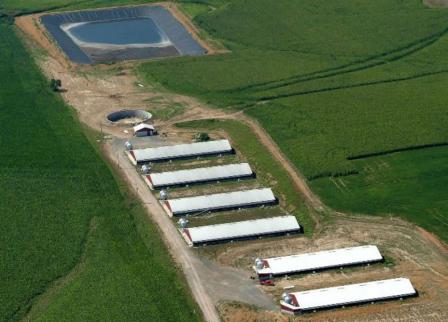The Benefits of Anaerobic Digestion
Anaerobic digesters on livestock farms have many benefits compared to traditional manure management systems, including:
- Diversified Farm Revenue
- Rural Economic Growth
- Conservation of Agricultural Land
- Energy Independence
- Sustainable Food Production
- Farm-Community Relationships
Diversified Farm Revenue
Looking for ways to diversify revenue is critical to the long term financial viability of many farms. While manure has always traditionally been a resource on the farm as a fertilizer, alternative products can be produced creating new income generating opportunities. Maximizing the value of manure increases farmers’ resiliency to the uncertainty of commodity product markets.
Manure digester systems provide:
- "Tipping fees" received for the management of non-farm organic waste streams. This not only boosts direct revenues, but provides additional biogas for energy production.
- Organic nutrients from the liquid and solid by-products of digested manure. These can be used both on-farm or sold to other local or regional agriculture and horticulture sources.
- Animal bedding or peat moss replacement from digested solids.
- Biogas produced from the breakdown of the manure. Biogas is a source of renewable energy for electricity, heat, and fuel for on-site use or sale to the local grid.
 Products created from manure lessen our dependence on finite resources such as phosphorous, petroleum and peat moss.
Products created from manure lessen our dependence on finite resources such as phosphorous, petroleum and peat moss.
For example, seed planters made from manure at Freund Farms are being produced and sold commercially worldwide.
Rural Economic Growth
As farmers look to innovative ways to economically and environmentally manage their manure, there are opportunities for rural economic growth. Constructing and operating digesters offers new local job opportunities and increases local tax revenue.
Manure digesters create opportunities for:
- Local expertise in contracting, site work, concrete, plumbing, electrical, permitting, and engineering during planning and construction.
- Skilled labor to keep the system running at optimal levels once operational.
- Businesses built around nutrients, manure solids, and energy markets. Cooperative business models can share the risk and reward across farms and private investors.
- Agro-tourism: advanced manure management has served as a springboard for people to visit farms, where they learn more about environmental improvements and where their food comes from.
Fair Oaks Farms in Northwest Indiana doubles as an agricultural science center as well as an opportunity for the public to see where their food comes from. The farm’s attractions include tours of their dairy and swine operations as well as a restaurant. The farm is planning to expand with an on-site hotel to accommodate the more than 600,000 annual visitors.
Conservation of Agricultural Land
Healthy soil and water is important to farmers, their families and the community. The vast majority of farms in America are family-owned and active conservation practices can continue to pass this legacy from one generation to the next.
Implementing manure digesters on livestock facilities can:
- Improve soil health by converting the nutrients in manure to a more accessible form for plants to use.
- Help protect the local water resources by reducing nutrient run-off and destroying pathogens.
 On Blue Spruce FarmExit in Vermont, post-digester liquid fertilizer is applied to the fields with an aerator, or directly onto the growing hay crops. This reduces potential for run off and the need to purchase commercial, fossil fuel-based fertilizers.
On Blue Spruce FarmExit in Vermont, post-digester liquid fertilizer is applied to the fields with an aerator, or directly onto the growing hay crops. This reduces potential for run off and the need to purchase commercial, fossil fuel-based fertilizers.
Energy Independence
Many early farms and other agricultural operations, such as mills, were often energy independent, getting their power from wind or water sources. Manure provides an opportunity for farm energy independence. Biogas from manure is composed of more than 50% methane, the primary component of renewable natural gas.
Manure digester systems can:
- Meet on-farm energy needs. Biogas can be used to generate electricity for lighting barns or houses, heat for warming barns and on-site greenhouses, energy for cooling milk, and fuel for running on-site vehicles. It allows the farmer to operate ‘off the grid’ and reduces reliance on utilities.
- Provide energy to the local grid. This can help the local utility meet growing energy demand with locally sourced renewable energy.
- Reduce greenhouse gas emissions by capturing methane gas that may otherwise have been lost to the atmosphere and by displacing fossil fuel energy use.

Converting digester biogas to vehicle fuel allows some dairy farms to fuel fleets on compressed natural gas versus diesel fuel – saving money while cutting emissions.
Prairie's Edge Dairy Farm, a member of Fair Oaks Farms, runs a fleet of 42 trucks. These trucks fill up at the farm's compressed natural gas (CNG) filling station and travel an average of 270,000 miles a year.

Reinford Farms converts manure biogas to electricity, which they sell back to the grid. The digester also reduces energy costs on-farm. Heat is used to dry corn, warm their house and shop, heat all of the farm’s hot water, and pasteurize calf milk.
Sustainable Food Production
A safe, nutritious, and affordable food supply is needed to sustain populations worldwide. Farmers work hard to meet the growing food demand and remain viable in today’s global marketplace. Efficiently using water and nutrients for crop and animal needs can cut costs, reduce environmental impacts, and contribute to a safer, more productive farm.
Manure digesters on livestock farms can:
- Protect animal and human health by reducing pathogens.
- Convert nutrients in manure into a form that is more accessible for plants to use compared to raw manure. This can increase crop productivity and yield.
- Recycle nutrients on the farm, creating an economically and environmentally sustainable food production system.
- Produce heat, electricity, or fuel from biogas which can be used on-farm, lessening the agriculture sector’s dependence on fossil fuel energy.
- Accept food waste from places like restaurants and grocery stores. This means less food waste is sent to landfills. Food waste has the added benefit of increasing the efficiency of farm digesters.
On-farm digesters can divert waste from landfills and create renewable energy. Barstow’s Longview Farm, in partnership with Vanguard Renewables, receives more than 14,000 tons of food waste annually from food manufacturers, processors, and producers such as Cabot Creamery, Geissler’s Supermarkets, HP Hood, Wind River, Cains, Garelick, Amenico, and McDonalds.
Farm-Community Relationships
Maintaining good relationships with neighbors is important as populations continue to grow and farms become physically closer to new housing or commercial developments. Reducing odors and other impacts of livestock can improve farm-community relations and make business growth possible for farmers.
Manure digester systems can help:
- Reduce odors from livestock manure.
- Provide an easier path to farm growth. Limiting the impacts of the farm on the local community makes farm expansion plans much more palatable to local citizens.
- Connect farmers to their communities. On many farms, installation of these systems has provided a ‘teaching moment’ with school kids and adults alike. Many farms regularly run tours of their digester systems, allowing people to learn about digesters and biogas energy, as well as where their food comes from and how it’s produced.
 When Danny Kluethe Farm decided to expand their 6,000 head swine operation, they were concerned about the adverse effects of a large-scale feeding operation on their neighbors. When they learned that manure that comes out of an anaerobic digester is basically odorless, they decided it would be a perfect fit.
When Danny Kluethe Farm decided to expand their 6,000 head swine operation, they were concerned about the adverse effects of a large-scale feeding operation on their neighbors. When they learned that manure that comes out of an anaerobic digester is basically odorless, they decided it would be a perfect fit.


